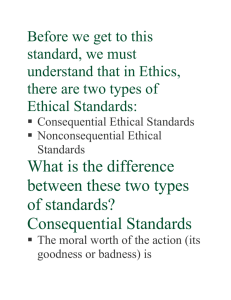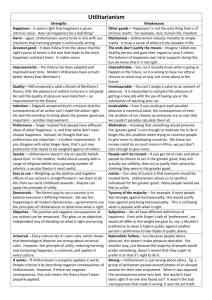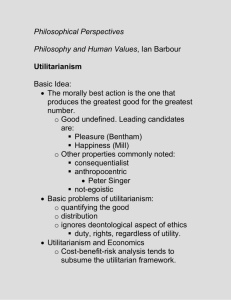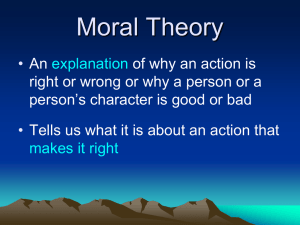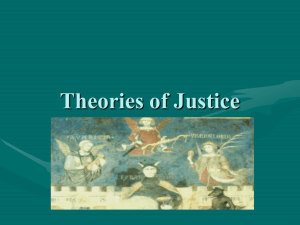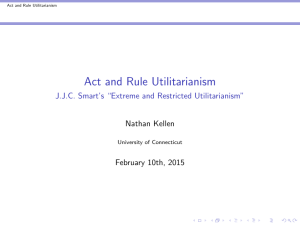File - Mr. Bull - A-Level and GCSE Religious Studies
advertisement
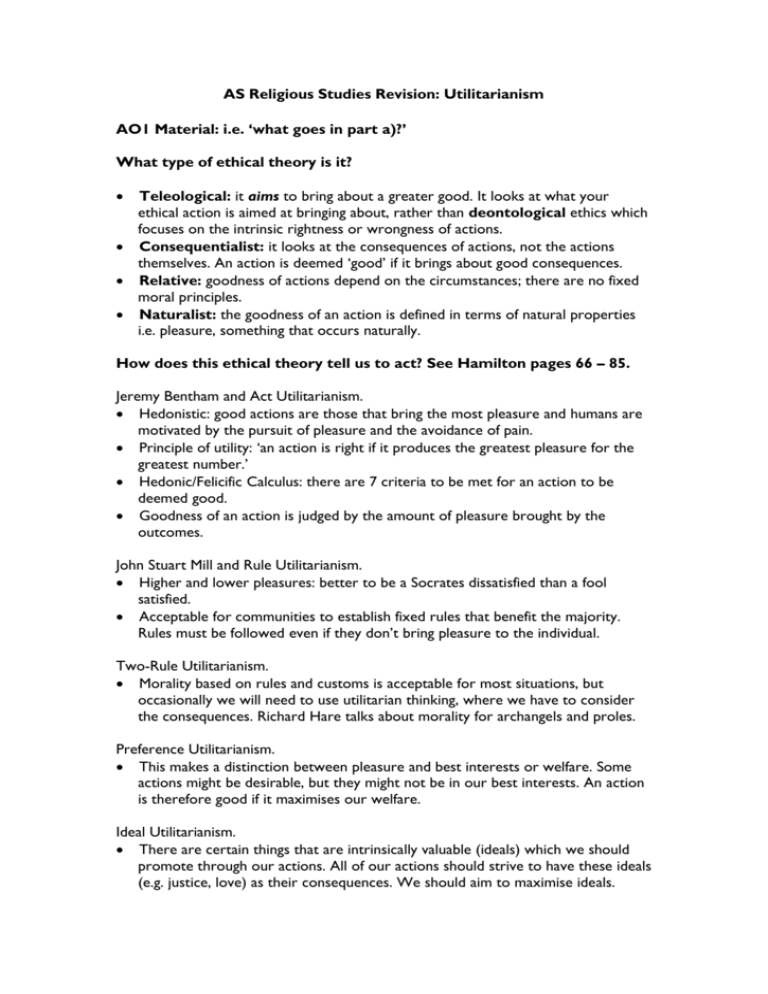
AS Religious Studies Revision: Utilitarianism AO1 Material: i.e. ‘what goes in part a)?’ What type of ethical theory is it? Teleological: it aims to bring about a greater good. It looks at what your ethical action is aimed at bringing about, rather than deontological ethics which focuses on the intrinsic rightness or wrongness of actions. Consequentialist: it looks at the consequences of actions, not the actions themselves. An action is deemed ‘good’ if it brings about good consequences. Relative: goodness of actions depend on the circumstances; there are no fixed moral principles. Naturalist: the goodness of an action is defined in terms of natural properties i.e. pleasure, something that occurs naturally. How does this ethical theory tell us to act? See Hamilton pages 66 – 85. Jeremy Bentham and Act Utilitarianism. Hedonistic: good actions are those that bring the most pleasure and humans are motivated by the pursuit of pleasure and the avoidance of pain. Principle of utility: ‘an action is right if it produces the greatest pleasure for the greatest number.’ Hedonic/Felicific Calculus: there are 7 criteria to be met for an action to be deemed good. Goodness of an action is judged by the amount of pleasure brought by the outcomes. John Stuart Mill and Rule Utilitarianism. Higher and lower pleasures: better to be a Socrates dissatisfied than a fool satisfied. Acceptable for communities to establish fixed rules that benefit the majority. Rules must be followed even if they don’t bring pleasure to the individual. Two-Rule Utilitarianism. Morality based on rules and customs is acceptable for most situations, but occasionally we will need to use utilitarian thinking, where we have to consider the consequences. Richard Hare talks about morality for archangels and proles. Preference Utilitarianism. This makes a distinction between pleasure and best interests or welfare. Some actions might be desirable, but they might not be in our best interests. An action is therefore good if it maximises our welfare. Ideal Utilitarianism. There are certain things that are intrinsically valuable (ideals) which we should promote through our actions. All of our actions should strive to have these ideals (e.g. justice, love) as their consequences. We should aim to maximise ideals. AO2: Critical evaluation i.e. ‘what do I put in part b)?’ Remember to read the question first before just regurgitating. Some Strengths of Utilitarianism. Not deontological, so we do not end up with a conflict of duties (e.g. the Jim and the Indians situation); we can decide which action is best and brings the best consequences. We are able to consider the consequences of our actions, unlike with deontological ethics. Utilitarianism is secular: it could therefore appeal to the non-religious as an ethical system and does not depend upon God to underwrite moral norms. Utilitarianism appeals to our inherent desire to pursue what is pleasurable in life. Utilitarianism doesn’t make us slaves to rules and appeals to the sense of wanting to make exceptions in extraordinary circumstances. The hedonic calculus tells us how we ought to act in any given situation: it provides a decision procedure. Some Weaknesses of Utilitarianism. It allows us to do evil so that good might come. For example, in a time of crisis, innocent people may be imprisoned or executed if it calms down the population (if say they are believed to be responsible for terrorist acts). The British police were guilty of this during the Northern Irish troubles. The no-rest objection: act utilitarianism, if followed to the letter, could prevent us from doing things we enjoy. See Hamilton p77. Some would argue that we are not just motivated by the pursuit of pleasure and avoidance of pain, but that many are motivated by other things such as spiritual truth or objective moral values. It is not always possible to predict the consequences of our actions. Because Utilitarianism depends on this, it is flawed in this respect. It is too impartial: the burning house dilemma. If a house is burning down and it contains your Mum and a cancer specialist who is about to develop a cure for cancer, who should you save? It would have to be the cancer specialist. Utilitarianism does not take account of family ties. Utilitarianism treats everything as a means to an end: this contradicts Kant who argues that humans should never be treated as a means to an end, but as ends in themselves. Act Utilitarianism could subvert justice: it could allow for the torture and imprisonment of the innocent if it serves a greater good.


